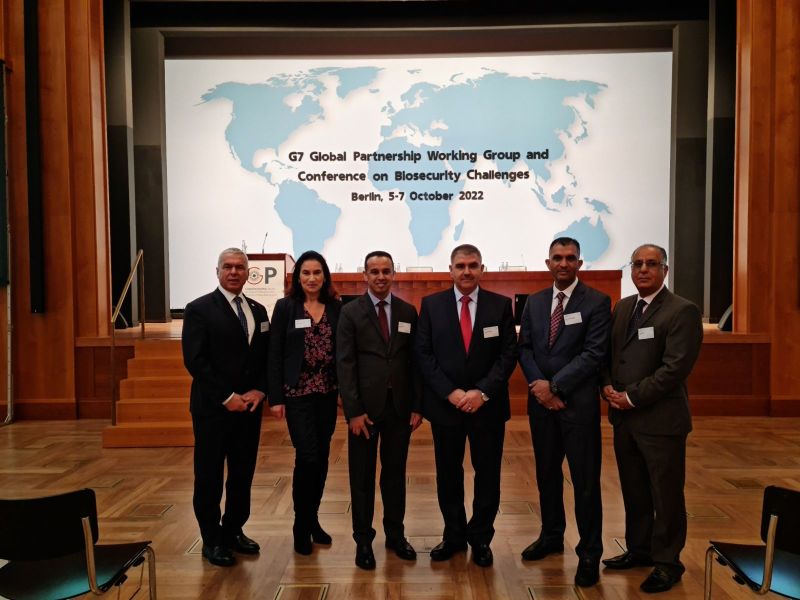German G7 Global Partnership 2022 Presidency provided leadership and took action to enhance multi-stakeholder cooperation to reduce CBRN threats. ICCSS as an member of G7 Global Partnership (G7 GP), actively participated in these G7 GP efforts with an emphasis on Chemical Security Working Group. ICCSS led and received G7 GP support to enhance chemical safety and security and civil protection in Easter Europe and the Middle East and to develop cybersecurity and reliability.
ICCSS took an active part in s first G7 Global Partnership meeting in physical setting since COVID-19 which took place in Berlin on 5-7 October 2022 in Berlin. The G7 GP Berlin meeting confirmed ongoing support of 31 member countries to reduce CBRN threats. A special attention was given to assist Ukraine in its war against Russia unjustified military aggression. The partners agreed, as proposed by ICCSS, to enhance participation of private sector and civil society in the G7 GP work.
G7 Global Partnershipwill remain a true venue for multi-stakeholder cooperation and whole government or whole- society approach to reduce CBRN threats. G7 GP will further expand use of its website: https://www.gpwmd.com, issue regular newsletter, and promote its activities via GP Twitter account: @GPWMDofficial.
ICCSS was represented in Berlin by its president Amb. Krzysztof Paturej, and members of the ICCSS Global Team Members. As a global leader and participant in national, regional and worldwide chemical safety and security, ICCSS presented its regional programs for the Easter Europe and the Middle East, and innovative industrial cybersecurity solutions. ICCSS participants conducted a series of bilateral meetings, including Germany, France, Italy, Japan, Norway, United Kingdom, US, UN, EU, INTERPOL, UNICRI. In a series of meetings with Ukraine Delegation, ICCSS President furthered its ongoing support and agreed new assistance activities for partners from Kharkiv and Lviv. ICCSS actively cooperated with Jordan Delegation. Head of Jordan Delegation delivered a joint Jordan-ICCSS statement in the Opening Plenary Session (joint statement) started with the development of regional centre for chemical safety and security (ChemReg) in Amman, funded by France. Jordan and ICCSS promoted the introduction of Chemical Safety and Security Confidence Building Measures in the Middle East. Jordan and ICCSS sought financial support to implement a series of projects to develop national regulatory system in chemical security in Jordan, with an emphasis on Aqaba region.
G7 Global Partnership 2023 goes to Japan. ICCSS hopes the Japan 2022 GP Presidency will support chemical safety and security and cybersecurity as priorities. ICCSS proposed to include Middle East as one of the G7 GP leading issues, based on the Jordan and ICCSS developed Middle East Chemical Safety and Security Program, and Chemical Safety and Security Confidence Building Measures in the Middle East.
Relevant information and documents:
ICCSS inG7 Global Partnership – ICCSS is a member of the G7 Global Partnership (G7 GP) Working Group against the spread of materials and weapons of mass destruction and actively participates in the Plenary Sessions and in the Chemical Security Working Group (CSWG), Biosecurity Working Group (BSWG) and CBRN Working Group. ICCSS leads within the G7 GP regional chemical safety and security. ICCSS jointly with Jordan seek G7 GP support for the program on chemical safety and security in Jordan and the Middle East. ICCSS proposals to enhance resilience against cyber threats and reliability in chemical and petrochemical industries will be discussed further in the G7 GP Working Groups.
The Global Partnership Against the Spread of Weapons and Materials of Mass Destruction(G7 Global Partnership) https://www.gpwmd.com/ is a G7-led, 31-member international initiative aimed at preventing the proliferation of chemical, biological, radiological, and nuclear (CBRN) weapons and related materials. The Global Partnership serves as an international forum for coordination and delivery of programming to prevent CBRN terrorism and proliferation, follows a set of Principles and Guidelines that were established at the Kananaskis Summit (2002). G7 GP is chaired by GP Presidency. The Global Partnership relies on all member nations and partner organizations to bring their ideas and resources to the table. It also welcomes suggestions and proposals for collaborative threat reduction programming from external implementing partners (e.g. NGOs). Canada leads the G7 GP matchmaking.
GOING REGIONAL ON CHEM-BIO SAFETY AND SECURITY. Each region poses different security challenges as well as opportunities. Different regions have their own cultural distinctiveness, and this is true even within regions. Many regions do not have the capacity to take on many of the existing chem-bio safety and security risks and challenges. Because of growing chemical and bio security risks, ICCSS has identified and developed concrete programs for the regions of Eastern Europe and the Middle East, as priorities. Within ICCSS implemented EU-CHEM-REACT program, financed by EU, Belarus, Ukraine and Moldova are engaged in the development of modern civil protection and chemical and bio threat reduction.
MIDDLE EAST CHEMICAL SAFETY AND SECURITY PROGRAM, AND CHEMICAL SAFETY AND SECURITY CONFIDENCE BUILDING MEASURES IN THE MIDDLE EAST
Within the ICCSS led Jordan program on chemical safety and security, financed by US DTRA, Jordan developed a model chemical security national regulatory framework. The project development offers Jordan as regional hub for chemical safety and security. This program will also cover bio-security concerns. Due to France financial support regional centre for chemical safety and security (ChemReg) in Amman was developed. This is a first project within the Middle East Chemical Safety and Security Program, which includes the development of Jordan as regional hub for chemical safety and security.
ICCSS develops Regional Centre For Chemical Safety And Security (ChemReg) in Amman, Jordan - From enhancing Chemical Security in Jordan to the development of Middle Chemical Safety and Security Program and Introducing Chemical Safety and Regional Security Confidence Building Measures
ChemReg has been developed as result of successful implementation of the Jordan Chemical Safety and Security project funded in 2018-2019 by US DTRA, led by ICCSS and Jordan Armed Forces (JAF), continued by project on development of the Joint CBRN Training Facility in Amman as a regional centre for chemical safety and security, funded by France within G7 Global Partnership
ChemReg development is a core element of the Middle East Programme proposed by the ICCSS and Jordan to respond to urgent needs of the Middle East countries and African countries to respond to continued and growing threat of misuse of chemicals.
ChemReg VISION is to develop, maintain and offer professional staff to reduce chem-bio threats and enhance civil protection and chem-bio safety and security, nationally and regionally.
ChemReg develops and provides standardized and certified training courses in chem-bio and environmental safety and security and civil protection for Jordan and the regions of the Middle East and North Africa
ChemReg serves as training hub in Train the Trainers (TTT) format:
40 Jordan trainers with different competences provide basic and specialized trainings
Female ChemReg trainers provide training courses in safety and security and civil protection for female candidates
ChemReg develops network of regional trainers and trainings courses/exercises
ChemReg developson-line reference library to assist trainers, trainees and national and industry users with safety and security in whole chain of chemical activities
ChemReg invites international partners, including OPCW, EU, NATO, UN, INTERPOL, WCO, to use its premises and trainers to conduct their related activities in the Middle East and North Africa.
ENHANCING CIVIL PROTECTION AGAINST CBRN THREATS IN EASTERN EUROPE - CIVIL PROTECTION BEYOND BORDERS
Financed from EU grants, EU-CHEM-REACT projects enhance national and regional capacity building in civil protection and cooperation in reducing chemical threats, through series of civil protection exercises and trainings outside EU, while promoting use of EU Civil Protection Mechanism (UCPM) and EU tools. A first EU-CHEM-REACT project (2017-2018) developed and conducted a series of European civil protection exercises in Ukraine. Within NET-CBRN-REACT project, financed by the EU, ICCSS has built a multi-stakeholder partnership from Eastern Europe, Middle East, international organisations and industries, to cooperate and exchange in civil protection knowledge, trainings and exercises. EU-CHEM-REACT 2 conducted a series of civil protection exercise exercises in Belarus, Moldova and Ukraine. The EU-CHEM-REACT is continued with EU funded EURO-MED-REACT project to conduct - in 2022-2023 - civil protection exercises and trainings in Jordan, Moldova and Ukraine.
Led by ICCSS, EURO-MED-REACT brings together partners from EU (Czech Republic, Latvia, Lithuania, Poland, Slovakia, Romania), Eastern Europe (Moldova and Ukraine) and the Middle East (Jordan). EURO-MED-REACT Core Objectives: To offer better and more prompt disaster risk management in Eastern Europe and the Middle East through strengthening effectiveness and efficiency of collective civil protection and disaster management efforts, and align EU neighborhood countries with Union Civil Protection Mechanism (UCPM), UCPM Knowledge Network and European Union and international tools.
EURO-MED-REACTCore Activities
- Exercises and trainings to use UCPM in Eastern Europe and the Middle East to respond to mitigate natural and man-made disasters and emergencies in a trans-border context.
- Development of methodology of designing, preparing, and conduct Table Top (TTX) and Field Exercises (FSX);
- Establishment of a Regional Training and Exercise Network in civil protection and crisis management;
- Development of scenarios and exercises for major forests fires and floods to endanger chemical plants and energy sources.
Within a new EURO-MED-REACT project, funded by EU, being implemented in 2022-2023, ICCSS leads an international consortium of countries from Eastern Europe, EU and the Middle East to conduct a series of exercises and trainings in Jordan, Moldova and Ukraine, on reducing chem-bio threats and enhancing civil protection.
DIGITIZING INDUSTRY TO ENHANCE CHEM-BIO SECURITY AND CYBERSECURITY
ICCSS INDUSTRY CYBERSECURITY AND RELIABILITY GOALS
- Building a cybersecurity, resilience and reliability as a whole organizational effort, starting Board level
- Promoting cybersecurity, resilience and reliability culture, nest practices and capacity building by developing and promoting manual for industrial cybersecurity, resilience and reliability
- Offer a series of industry cybersecurity trainings to enhance resilience against cyber threats and reliability awareness
- Partner with a technology providers to demonstrate y show how best practices can be effectively applied with the use of 3rd party software
- Enter international market with ICCSS program on increasing resiliance against cyber threats.
ICCSS INDUSTRY CYBERSECURITY AND RELIABILITY ACTIVITIES
The ICCSS has introduced 3 market specialties in industrial cybersecurity and reliability for technicians, management and policy. The new market industrial cybersecurity specialties focus both on how to operate cybersecurity in IT and OT at industrial sites and on reliability, as the very core of the cybersecurity design. Development and wide implementation of the above professional competences, based on knowledge of legal norms, management and good engineering practices, will be an important instrument to achieve the basic goal: preventing the cyber-intruder before he stops the industrial installation. The introduction of these market specialties will lower costs of cybersecurity services for Small and Medium Companies (SMI) and local administration. 6 innovative offers and approaches to enhance industry cybersecurity and reliability.
ICCSS leads international team which prepares Manual of best practices in cybersecurity and reliability in the chemical and energy carriers industries. The international Task Force include partners, inter alia, from Canada, Italy, Ukraine and US.
ICCSS offers roadmap For Raising Cybersecurity Awareness and Responsibility for international organisations and multi-national companies. It focuses on gathering and sharing of the most recent knowledge in terms of procedures, technical solutions and trainings in cybersecurity and reliability. ICCSS connects the subject of automation with the subjects of security of access and corporate architecture.
ICCSS offers unique training program to increase resilience against cyber threats. This program addresses and promotes also human behaviour as equally important factor in cyber-security. It supports ‘cyber-hygiene’, a set of routine measures that, where implemented and carried out regularly by organisations and businesses, minimize their exposure to risks from cyber threats.
Within Cybersecurity and Reliability Program ICCSS Proposes the following:
- Offer on Building Awareness about Cyber Threats And Increasing Reliability Against Cyberattacks In the Company
- Conference/Training: Cybersecurity and Industry Reliability, for central and local administrations, Small and Medium Companies, and academia
- Conference/Training: Cybersecurity and Industry Reliability

